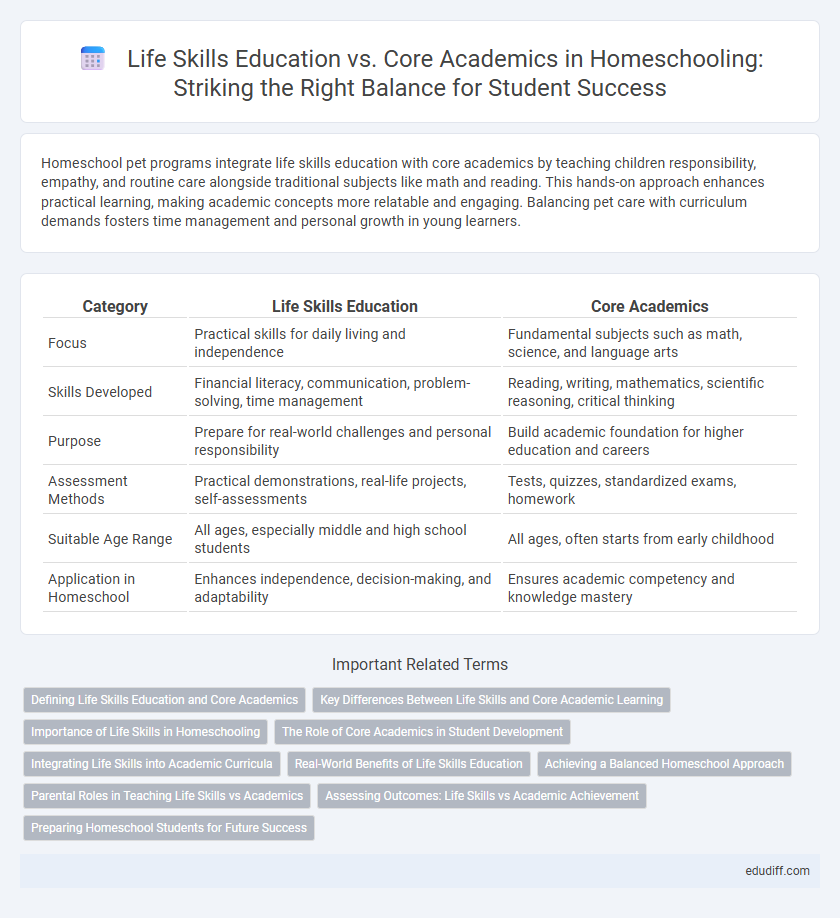Homeschool pet programs integrate life skills education with core academics by teaching children responsibility, empathy, and routine care alongside traditional subjects like math and reading. This hands-on approach enhances practical learning, making academic concepts more relatable and engaging. Balancing pet care with curriculum demands fosters time management and personal growth in young learners.
Table of Comparison
| Category | Life Skills Education | Core Academics |
|---|---|---|
| Focus | Practical skills for daily living and independence | Fundamental subjects such as math, science, and language arts |
| Skills Developed | Financial literacy, communication, problem-solving, time management | Reading, writing, mathematics, scientific reasoning, critical thinking |
| Purpose | Prepare for real-world challenges and personal responsibility | Build academic foundation for higher education and careers |
| Assessment Methods | Practical demonstrations, real-life projects, self-assessments | Tests, quizzes, standardized exams, homework |
| Suitable Age Range | All ages, especially middle and high school students | All ages, often starts from early childhood |
| Application in Homeschool | Enhances independence, decision-making, and adaptability | Ensures academic competency and knowledge mastery |
Defining Life Skills Education and Core Academics
Life Skills Education in homeschooling encompasses practical abilities such as financial literacy, communication, time management, and problem-solving, essential for everyday living and personal development. Core Academics focus on traditional subjects including mathematics, science, language arts, and social studies, forming the foundational knowledge base for higher education and career readiness. Balancing these two educational components ensures a holistic homeschool curriculum that prepares students for both academic success and real-world challenges.
Key Differences Between Life Skills and Core Academic Learning
Life skills education emphasizes practical abilities like financial literacy, communication, and problem-solving, whereas core academics focus on traditional subjects such as math, science, and language arts. Life skills foster real-world readiness and personal development, while core academics build foundational knowledge essential for higher education and standardized assessments. Integrating both ensures a balanced homeschool curriculum addressing cognitive growth and everyday competencies.
Importance of Life Skills in Homeschooling
Life skills education in homeschooling cultivates critical abilities such as financial literacy, time management, and effective communication, ensuring students are well-prepared for real-world challenges beyond academic knowledge. While core academics build foundational knowledge in subjects like math and science, integrating life skills fosters independence, problem-solving, and emotional intelligence essential for personal and career success. Emphasizing life skills within the homeschool curriculum enhances holistic development, equipping learners with practical tools to navigate everyday life confidently.
The Role of Core Academics in Student Development
Core academics in homeschool settings provide essential knowledge in subjects like mathematics, science, language arts, and social studies, forming the foundation for critical thinking and problem-solving skills. Mastery of core subjects enhances cognitive development and prepares students for higher education and career opportunities. Integrating life skills education with core academics cultivates well-rounded individuals capable of adapting to real-world challenges.
Integrating Life Skills into Academic Curricula
Integrating life skills into core academic curricula enhances student preparedness by blending practical competencies like financial literacy, critical thinking, and communication with traditional subjects such as math, science, and language arts. This holistic approach promotes real-world application of knowledge, fostering adaptability and problem-solving abilities essential for lifelong success. Schools that adopt this integration report improved student engagement and better long-term educational outcomes.
Real-World Benefits of Life Skills Education
Life skills education equips homeschool students with essential abilities such as financial literacy, time management, and effective communication, directly preparing them for real-world challenges beyond academic knowledge. Mastering these practical skills fosters independence and problem-solving capabilities vital for personal and professional success. Incorporating life skills alongside core academics creates a balanced education that enhances long-term adaptability and confidence in diverse real-life situations.
Achieving a Balanced Homeschool Approach
Balancing life skills education with core academics in homeschooling cultivates well-rounded learners equipped for real-world challenges and academic success. Integrating practical skills like financial literacy, time management, and communication alongside subjects such as math, science, and language arts fosters both intellectual growth and everyday competence. A structured homeschool schedule that allocates dedicated time for experiential learning and core subjects ensures holistic development and prepares students for diverse future opportunities.
Parental Roles in Teaching Life Skills vs Academics
Parents play a crucial role in teaching life skills during homeschooling by integrating practical activities such as budgeting, cooking, and time management into daily routines, fostering independence and problem-solving abilities. Core academics often rely on structured curricula and standardized assessments, where parents act as facilitators and evaluators to ensure mastery of subjects like math, science, and language arts. Balancing life skills education with academic instruction enables parents to provide a holistic learning experience that prepares children for real-world challenges and academic success.
Assessing Outcomes: Life Skills vs Academic Achievement
Assessing outcomes in homeschooling requires balancing life skills education with core academic achievement, as both are crucial for comprehensive development. Life skills such as problem-solving, communication, and financial literacy prepare students for real-world challenges, while academic achievement in subjects like math, science, and language arts provides foundational knowledge and critical thinking abilities. Measuring progress involves portfolios, performance tasks, and standardized academic tests to ensure students excel in practical competencies and academic standards.
Preparing Homeschool Students for Future Success
Life skills education equips homeschool students with practical abilities like financial literacy, communication, and problem-solving that are essential for real-world challenges. Core academics provide foundational knowledge in subjects such as math, science, and language arts, forming the basis for higher education and career opportunities. Balancing life skills with core academics prepares homeschool students for future success by fostering both intellectual growth and essential everyday competencies.
Life Skills Education vs Core Academics Infographic

 edudiff.com
edudiff.com